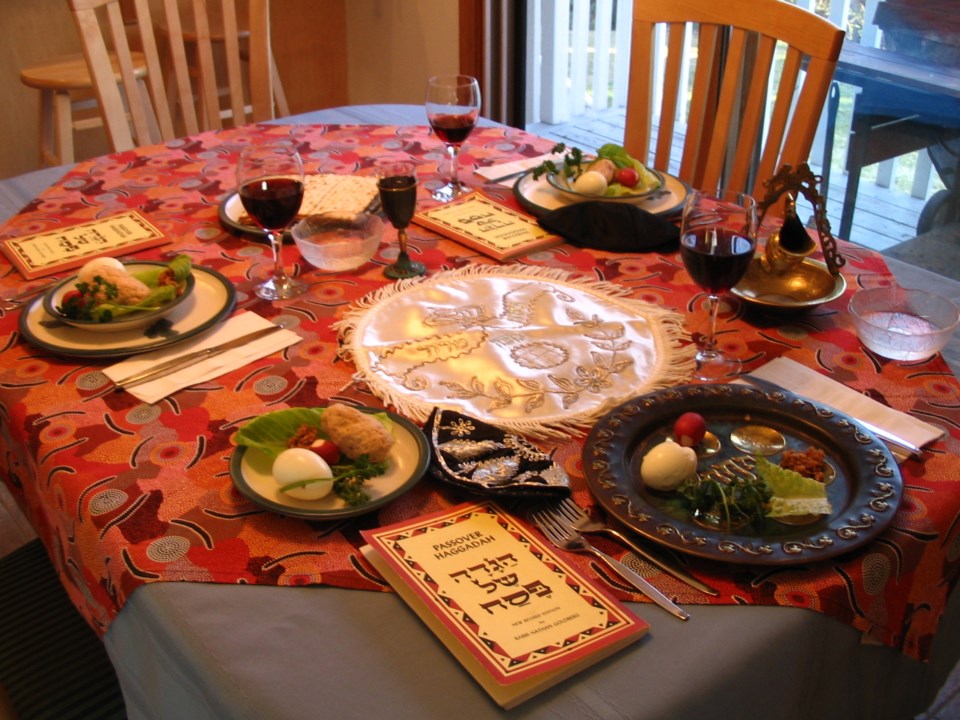This new column will explore Vancouver's religious and spiritual diversity, increasing understanding of our neighbours' beliefs, traditions and rituals. If you have an idea for a topic, email [email protected]
The Jewish holiday of Passover, which begins at sundown Monday for Vancouver’s estimated 20,000 Jews, is a celebration of redemption and freedom, a symbolic reenactment of the millennia-old story of the Hebrew people’s exodus from enslavement in Pharaoh’s Egypt.
But it is more than this.
In the longer story of the journey from bondage to freedom, the ancient Hebrew people transformed into a nation, known as the Jewish people, received the commandments from God at Sinai and, in the process, introduced to the world the concepts of ethical behavior that would define Christianity and Islam. There are only 14 million Jews in the world today, but the essentially Jewish concepts of ethical monotheism and divine law infuse Christianity, Islam and other traditions adhered to by almost four billion people.
In fact, while Passover is a Jewish holiday, there are Christians who observe it, in their way, because the most famous Passover meal was said to be the Last Supper of Jesus and his apostles. Some Muslims fast to commemorate the Hebrews’ escape to freedom. For Jews, Passover represents the immediacy of the past. By symbolically reliving the experience, contemporary Jews unite across time with ancient ancestors, drawing wisdom from the past to apply to today.
On Monday and Tuesday, the first nights of the eight-day celebration of Passover, Jewish families and their friends across Vancouver will participate in a meal-ceremony called a seder, which means “order.” The evening proceeds according to ancient traditions laid out in the Haggadah (literally, “telling”), from which participants read and discuss throughout the evening. Though following a standard form that makes it among the oldest continually practiced religious rituals in the world, every seder is different, because it is very much a participatory pageant.
Slavery, freedom and transformation are the main themes, represented in the foods on the ceremonial seder plate, such as bitter herbs symbolizing the bitterness of slavery, and a paste of fruit and nuts representing the mortar used by slaves in constructing buildings for their captors. Vegetables are dipped in salt water, symbolizing the tears of the slaves. Drops of wine are spilled, representing the 10 plagues that accompanied the exodus and, by extension, human suffering past and present. Cracker-like unleavened bread, matzo, is eaten to remember the haste with which the Hebrew people fled, leaving no time for bread to rise.
By its nature, the seder invites innovation. Since the Holocaust, some have added six drops of wine in memory of the six million Jews murdered by the Nazis. Other innovations have seen items added to the seder plate, such as an orange to symbolize women’s equality. The last few decades have seen a rise in tailored versions of the Hagaddah, applying the lessons of oppression and redemption to the experiences of women, gay people, animal rights activists and vegetarians. During the U.S. civil rights movement, Jewish activists led “freedom seders.”
But given the seder’s emphasis on conversation and sharing ideas, a whole new Haggadah is not necessary to modify the meal to a particular, let’s say, learning outcome. Earlier this month at the Oakridge library, Rabbi Joshua Corber, a Point Grey high and UBC alum recently returned from the Ziegler School of Rabbinic Studies in Los Angeles, led a few dozen Jewish Vancouverites in exploring how to turn their Passover meal into a “social justice seder.”
The lesson of ancient Jewish slavery, Corber said, is mirrored in modern-day slavery throughout the world, including human trafficking in the sex trade. The seder’s invitation, “All who are hungry come and eat,” has resonance in a province with the highest rate of child poverty in the country. When the time comes for dripping wine, Corber adds a drop for the Palestinian people.
Contemporary topics are easily incorporated into a seder. However, regardless of whether the seder is traditional or more modern, just as moving from slavery to freedom transforms people, so should the experience of the symbolic re-enactment.
Ideally, says Corber, “we’ve emerged from the seder different than when we sat down.”
While seders generally take place at the family table, the Ohel Yaacov Community Kollel (thekollel.com) offers first and second seders open to all who need a place to celebrate Passover. Some synagogues also hold seders.
Pat Johnson is a multiple award-winning writer on religion and infinite other topics.



